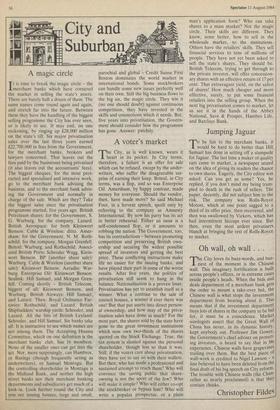A voter's market
The City, as is well known, wears it heart in its pocket. In City terms, therefore, a failure is an offer for sale which can be refused, except by the under- writers, who suffer the disagreeable sur- prise of earning their keep. Britoil, in City terms, was a flop, and so was Enterprise Oil. Amersham, by happy contrast, made money for everyone. Should the vendor, then, have made more? So said Michael Foot, in a fervent speech, spoilt only by referring to the company as Amnesty International. By now his party has its act in better rehearsal. Either an issue is a self-condemned flop, or it amounts to robbing the nation. The Government, too, has its contradictions — between promoting competition and preserving British own- ership and securing the widest possible spread of investors and getting the best price. These conflicting instructions make life no easier for the issuing banks, and have played their part in some of the worse results. After five years, the politics of privatisation still seem to hang in the balance. Nationalisation is a proven loser. Privatisation has yet to establish itself as a winner. What a contrast to the sale of council houses, a winner if ever there was one! But that put assets into direct person- al ownership, and how may of the priva- tisation sales have done as much? For the most part, the shares sold by the state have gone to the great investment institutions which now own two-thirds of the shares quoted on the Stock Exchange. True, the tax system is slanted against the personal shareholder, though less so than it was. Still, if the voters care about privatisation, they have yet to say so with their wallets. But then, who has made a professional and sustained attempt to reach them? Who will convince the saving public that share- owning is not the sport of the few? Who will make it simple? Who will either co-opt the stockbroker or bypass him? Who will write a popular prospectus, or a plain man's application form? Who can take shares to a mass market? Not the magic circle. Their skills are different. They know, none better, how to sell in the wholesale market, to the institutions. Others have the retailers' skills. They sell financial services to tens of millions of people. They have not yet been asked to sell the state's shares. They should be. British Telecom, trying to get through to the private investor, will offer concession- ary shares with an effective return of 17 per cent. That extravagant yield, on the safest of shares! How much cheaper and more effective, surely, to put some financial retailers into the selling group. When the next big privatisation comes to market, let us see it in the hands of the Abbey National, Save & Prosper, Hambro Life, and Barclays Bank.






































 Previous page
Previous page